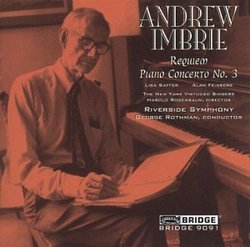Knotty but accessible music
J Scott Morrison | Middlebury VT, USA | 11/18/2002
(5 out of 5 stars)
"Andrew Imbrie, known to me before only for his opera based on Wallace Stegner's novel 'Angle of Repose', is represented on this disc by two large works. The Requiem, composed in response to the death of his son John in 1981, is a work written to a text that combines the ancient text of the Mass for the Dead with more modern poetry (Blake, Donne, George Herbert) that comments on death. It is a heartfelt work, written in Imbrie's knotty but melodious style, and feelingly performed by soprano Lisa Saffer and the New York Virtuoso Singers, a group dedicated to singing contemporary choral music. The Riverside Symphony (that's Riverside, New York City, not California) does a superb job of playing Imbrie's rhythmically complex music. The third Piano Concerto, commissioned by the Riverside Symphony for pianist Alan Feinberg, that indefatigable champion of modern piano music [just yesterday I heard him play the newly 'assembled' "Emerson" Concerto of Charles Ives], grows out of chords reminiscent, Imbrie says, of the New York City taxi horns of his childhood; he goes on to point out that they are nothing like Gershwin's Paris taxi horns in 'An American in Paris.' The slow second movement is a nocturne that has a lighter, playful middle section. The last movement is a rondo that builds in intensity to a climax that calls back the taxi horns of the first movement. No one but an American could have written this concerto, and it is fitting that a New York pianist and a New York orchestra have made this superb recording."
Overflows with Energy, Very Emotional
Sam A. Mawn-Mahlau | Winchester, MA USA | 02/29/2004
(5 out of 5 stars)
"The incredible burden of writing a requiem for your own 18 year old son must be overwhelming. Imbrie seems to tackle and invoke much of the Western cannon looking for the tones, solemn yet jarring, needed to express his deep grief and prayerful hope on the loss of his son. Imbrie writes a formal, traditional work in many ways, but tearing at this work is a subtext that is informed by more modern music that is less tonal and melodic. The tension between the two drives the emotion and energy in this work. Deeply moving."


 Track Listings (9) - Disc #1
Track Listings (9) - Disc #1